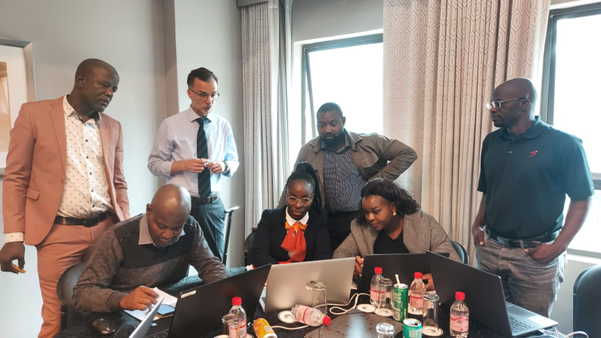Stronger capacity among officials will help eight countries in the region better coordinate and fast-track efforts to ease international trade.
© Shutterstock/ ingehogenbijl | A cargo truck on a highway through Mariental, Namibia.
More than 30 trade facilitation leaders from eight Southern African countries have completed an intensive executive training led by UNCTAD – the first of its kind in the region.
The programme, held between 28 and 31 March in Johannesburg, South Africa, aims at reinforcing the capacity of officials in charge of national trade facilitation committees (NTFCs) across Botswana, Eswatini, Lesotho, Malawi, Namibia, South Africa, Zambia and Zimbabwe.
Such committees are coordination bodies – established in most countries as public-private-partnerships – to help align national efforts to implement the historic Trade Facilitation Agreement of the World Trade Organization (WTO).
“Result-oriented and efficient NTFCs will support countries to streamline their international trade, contributing to bringing prosperity to all,” said Poul Hansen, who leads UNCTAD’s trade facilitation work.
UNCTAD support crucial
Over the past decades, UNCTAD has been gathering country cases and analysing data on how NTFCs around the world are operating.
Its empowerment programme since 2016 has provided intensive capacity-building for NTFCs’ members and secretariats in over 40 countries, enabling them to carry out trade facilitation reforms in a coordinated and sustainable manner.
Elaborating on experiences gained through the empowerment programme, UNCTAD has put forward a new intensive executive training for NTFC secretariats and chairpersons.
This is part of a broader initiative – funded by the United Kingdom government – to accelerate trade facilitation.
At the training sessions, experts underscore the vital role of NTFCs in complementing traditional capacity-building in customs and trade areas, thereby helping countries take stronger ownership of sustainable, long-term trade facilitation reforms.
“A well-functioning NTFC requires an excellent secretariat with the right skills, tools and clarity of purpose,” said Orlando Cantell, who heads the work focused on the World Trade Organization, trade facilitation and capacity building at the UK’s HM Revenue and Customs.
“UNCTAD’s training distills the wealth of international best practices, supporting secretariats to cope with turnover in staff and ensuring that NTFC momentum is maintained.”
Successful pilot
Before its regional rollout in Southern Africa, the training was first piloted in Madagascar in January.
The island country has a robust NTFC secretariat meeting regularly, comprising a dozen government staff with expertise in customs and trade.
In 2022, Madagascar implemented Article 3 of the Trade Facilitation Agreement on advance rulings. The country’s trade information portal is under development.
“The training was intense but effective,” said Rosianna Andrianasolo Manitra, a customs officer who also serves on Madagascar’s NTFC secretariat.
“Thanks to UNCTAD’s support, we as a secretariat are able to identify more pertinent means to ensure adequate coordination of our committee.”
Tailored training
The executive training for Southern Africa seeks to equip participants with the tools and knowledge to effectively steer an NTFC.
During the training event, UNCTAD presented 360-degree evaluation feedback on the region’s seven NTFCs, assessing four main responsibilities of an NTFC secretariat, including the organization of meetings, monitoring and evaluation, communication and knowledge management.
Participants also discussed leveraging UNCTAD’s reform tracker, a handy online tool first launched in Southern Africa in 2021 to coordinate NTFCs’ work in project and team management, output tracking and other issues.
Since then, the seven countries combined have garnered over 700 users, 46,000 page visits and 1,200 tasks programmed in their national reform trackers.
Actions to strengthen NTFCs
Other key topics at the training session included mobilizing funding for NTFCs and taking stock of trade facilitation progress in each country.
Participants produced 55 action points that were accounted for in each country’s reform tracker.
Their priorities for 2023 include sending outstanding notifications to the WTO, adopting terms of reference and establishing communication strategies for NTFC secretariats across Southern Africa.


